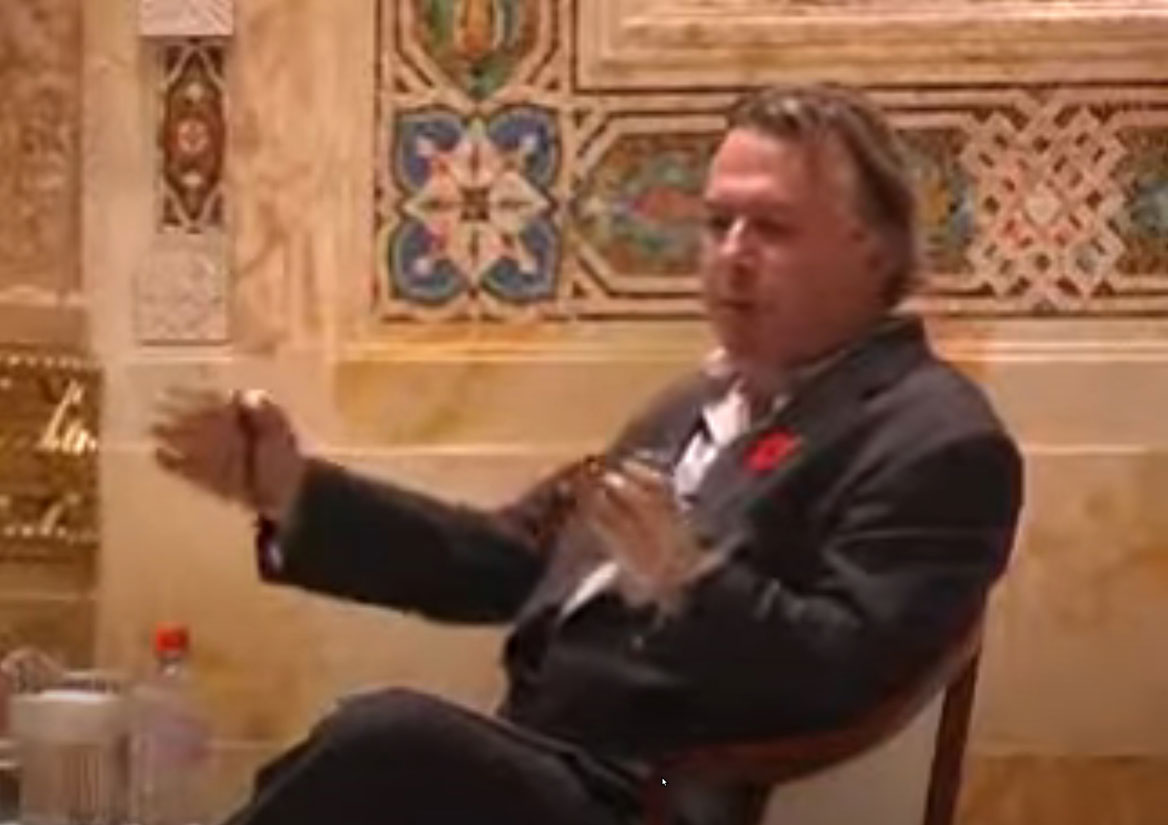A thought-provoking speech and debate sequence that delves into the merits and drawbacks of religious belief through a philosophical and ethical lens. Christopher, using sharp wit and critical reasoning, challenges the audience to reconsider the foundations of faith and the implications of divine design. He draws on historical examples, scientific insights, and theological critique to argue against the rationality of faith and the moral implications of religious dogma.
If you make the assumption that we are bodies, not just have bodies, then there isn't any mystery that remains to be explained about why a bleed in your brain will make you behave as if you weren't human anymore, unable to speak or think. The explanation is quite straightforward.
Christopher Hitchens' views on the afterlife fantasy and its contemptible aspects. Discover why eternal beliefs and religion are questioned by Christopher Hitchens in his talk alongside Sam Harris.
A critique of religious extremism, arguing that it often leads to cruelty, violence, and repression. Hitchens also argues that religious extremism can lead to horrific acts of violence, as seen in the example of a young girl in Somalia. The author further criticizes the association of religion with totalitarian regimes, suggesting that these regimes often mimic religious structures and ideologies. The text concludes with a discussion on religious pluralism, using the contrast between South and North Korea as an example.
Socialism must include beliefs in the equality of all human divisions, cooperation for civilization, the common treasury of the Earth, absence of God and the need for maximizing happiness in this life. Hitchens emphasizes the principle of "from each according to ability, to each according to need" and believes that class struggle is central to societal dynamics. He sees a need for transcending selfishness and fostering collective humanity due to the shared fate of modern times.
"Now, I'm sorry to have to begin by disagreeing with His Grace. If you're going to be a serious, grown-up person and appear to defend the Catholic Church in public, in front of an educated and literate audience, you simply have to start by making a great number of heartfelt apologies and requests for contrition and forgiveness..."
Hitchens argues that the faith mentality is twisted and immoral, with essential fanaticism and a fantasy of purity. He states that religion forces nice people to do unkind things and makes intelligent people say stupid things. The speaker questions whether it is good for the world to appeal to our credulity and not our skepticism, and whether it is good to worship a deity that takes sides in wars and human affairs.
Christopher Hitchens And Tariq Ramadan Debate. The fall of Christendom, once a term that extended across the world, is now only used historically or sarcastically. According to Durman McCullough's history of Christianity, it wasn't until 1914 when all the Christian empires of the world went to war with each other that Christendom truly ended. However, the Caliphate, the Muslim Caliphate, also came to an end due to its involvement in the war on the side of German, Austrian, and Hungarian imperialism.
Christopher Hitchens discusses the harmful effects of religion on society, using examples such as the sectarian violence in Belfast, Iraq, Beirut, and Bosnia, and the persecution of minority citizens in Bombay. He argues that religion exacerbates and deepens these issues, and that the religious impulse itself should be opposed and criticized. Hitchens maintains that those who hold secular views are open to argument and evidence, and should not be compared to religious fanatics.
William Lane Craig Vs. Christopher Hitchens. Christopher Hitchens discusses the differences between presuppositionalists and evidentialists when it comes to arguments for belief in God. He argues that the distinction between the two is false, and that there are no convincing reasons or evidence to support belief in God or a divine creator. He also discusses the fallacies of fine-tuning and pattern-seeking, and suggests that the universe and life are the result of random mutation and natural selection, rather than the product of divine design.
Debate TranscriptsChristopher Hitchens2023-11-13T03:05:42+00:00










